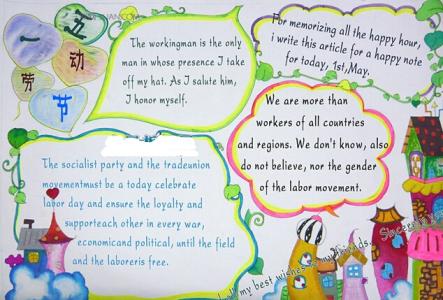关于劳动节英语手抄报内容大全
1:劳动节英语手抄报内容:传统的劳动节的起源和庆祝活动 Traditional May Day origins and celebrations
The earliest May Day celebrations appeared in pre-Christian times, with the Floralia, festival of Flora, the Roman goddess of flowers, held on April 27 during the Roman Republic era, and with the Walpurgis Night celebrations of the Germanic countries. It is also associated with the Gaelic Beltane, most commonly held on April 30. The day was a traditional summer holiday in many pre-Christian European pagan cultures. While February 1 was the first day of spring, May 1 was the first day of summer; hence, the summer solstice on June 25 (now June 21) was Midsummer.
As Europe became Christianised, the pagan holidays lost their religious character and May Day changed into a popular secular celebration. A significant celebration of May Day occurs in Germany where it is one of several days on which St. Walburga, credited with bringing Christianity to Germany, is celebrated. The secular versions of May Day, observed in Europe and America, may be best known for their traditions of dancing around the maypole and crowning the Queen of May. Fading in popularity since the late 20th century is the giving of "May baskets," small baskets of sweets or flowers, usually left anonymously on neighbours' doorsteps.
Since the 18th century, many Roman Catholics have observed May – and May Day – with various May devotions to the Blessed Virgin Mary. In works of art, school skits, and so forth, Mary's head will often be adorned with flowers in a May crowning. May 1 is also one of two feast days of the Catholic patron saint of workers St Joseph the Worker, a carpenter, husband to Mother Mary, and surrogate father of Jesus. Replacing another feast to St. Joseph, this date was chosen by Pope Pius XII in 1955 as a counterpoint to the communist International Workers Day celebrations on May Day.
In the late 20th century, many neopagans began reconstructing traditions and celebrating May Day as a pagan religious festival.
最早的五一庆祝活动出现了前基督教时代,与Floralia,植物,花卉,罗马共和国时期4月27日举行的罗马女神的节日,并与日耳曼国家沃尔帕吉斯夜庆祝活动。它也与盖尔朔有关,最常见于4月30日在众多前欧洲基督教异教文化传统的暑假。而2月1日是春天的第一天,5月1日是夏天的第一天;因此,6月25日夏至(现为6月21日)是盛夏。
随着欧洲成为基督教化,异教节日失去了他们的宗教性质和五一变成一个流行的世俗庆典。五一节的庆祝显著发生在德国地方是几天上圣沃尔布加,将基督教传入德国贷记,庆祝之一。五一的世俗版本,在欧洲和美国观察到的,可能对他们周围的五朔节花柱跳舞,加冕五月女王传统最为著名。自20世纪后期流行衰落“五月篮子”,甜食或花的小篮子,通常是在邻居的家门口留下匿名的捐赠。
18世纪以来,许多罗马天主教徒观察日 - 和五一节 - 各种五月奉献给圣母玛利亚。在艺术上,学校短剧等等作品,玛丽的头经常会用在加冕五月鲜花装饰。 5月1日也是工人圣若瑟工人,木匠,丈夫圣母玛利亚和耶稣的养父天主教守护神两个节日之一。更换另一盛宴圣约瑟夫,这个日期在1955年被选为教皇庇护十二的对位对五一共产主义国际劳动节庆祝活动。
在20世纪后期,许多neopagans开始重建传统和庆祝五一节作为一个异教徒的宗教节日。
2:劳动节英语手抄报内容:英国劳动节 Great Britain
May Queen on village green, Melmerby, England
Children dancing around a maypole as part of a May Day celebration in Welwyn, England
Traditional English May Day rites and celebrations include Morris dancing, crowning a May Queen and celebrations involving a maypole. Much of this tradition derives from the pagan Anglo-Saxon customs held during "Þrimilci-mōnaþ"[6] (the Old English name for the month of May meaning Month of Three Milkings) along with many Celtic traditions[citation needed].
Dancing the May Pole at Llanelwedd in Wales, 1909.
May Day has been a traditional day of festivities throughout the centuries. May Day is most associated with towns and villages celebrating springtime fertility (of the soil, livestock, and people) and revelry with village fetes and community gatherings. Seeding has been completed by this date and it was convenient to give farm labourers a day off. Perhaps the most significant of the traditions is the maypole, around which traditional dancers circle with ribbons.
The May Day bank holiday, on the first Monday in May, was traditionally the only one to affect the state school calendar. In 2008, when Easter Sunday fell very early on 23 March, some schools broke up after Easter to even out the length of school terms. This meant that Good Friday (a common law holiday) and Easter Monday (a bank holiday), which vary from year to year, were days off. A repetition is not planned for 2016, when Easter Sunday is 27 March. The spring bank holiday on the first Monday in May was created in 1978; May Day itself – May 1 – is not a public holiday in England (unless it falls on a Monday). In February 2011, the UK Parliament was reported to be considering scrapping the bank holiday associated with May Day, replacing it with a bank holiday in October, possibly coinciding with Trafalgar Day (celebrated on October 21), to create a "United Kingdom Day.
五月皇后村绿,Melmerby,英格兰
传统的英国五一节仪式和庆祝活动包括莫里斯舞,加冕五月女王和涉及五朔节花柱庆祝活动。大部分这种传统的从众多传统凯尔特人[来源请求]沿着“Þrimilci-mōnaþ”[6](旧英文名称为三个挤奶的含义月月月)期间举办的异教徒盎格鲁 - 撒克逊海关派生的。

五一节一直是庆祝活动的传统一天整个世纪。五一最有城镇和村庄庆祝春天的生育(土壤,家畜和人)和狂欢与村祝宴和社区集会有关。播种已经完成了这个日期,这是方便给雇农一天。也许传统的最显著的是五朔节花柱,围绕传统舞蹈圈用丝带。
五一节,第一个星期一五月,传统上影响到公立学校日历上唯一的一个。 2008年,当复活节在3月23日很早就倒下了,一些学校分手后的复活节,甚至出学期的长度。这意味着,耶稣受难日(普通法假期)和复活节星期一(银行假期),从去年有所不同的一年,是休息日。重复不是计划2016年,当复活节是3月27日。在五月的第一个星期一的春季银行假日是在1978年创造的;五一节本身 - 5月1日 - 不是在英国公共假日(除非它是星期一)。在2011年2月,英国议会报告将考虑取消与五一相关的银行假日,10月份银行假日替换它,可能与特拉法加日重合(庆祝10月21日),来创建一个“英国日。
 爱华网
爱华网



